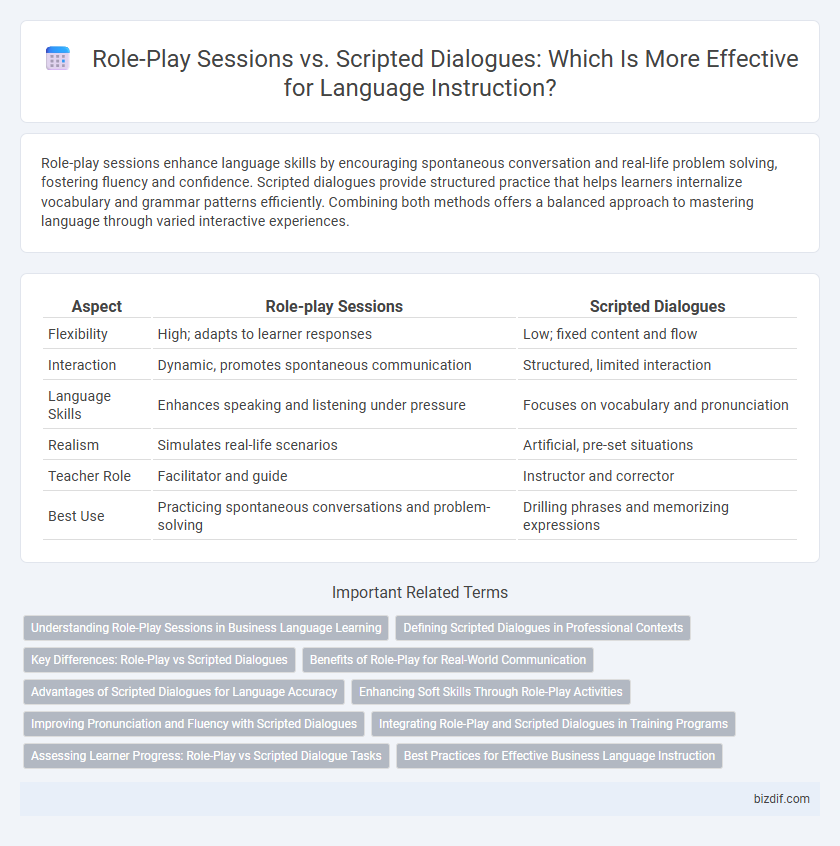Role-play sessions enhance language skills by encouraging spontaneous conversation and real-life problem solving, fostering fluency and confidence. Scripted dialogues provide structured practice that helps learners internalize vocabulary and grammar patterns efficiently. Combining both methods offers a balanced approach to mastering language through varied interactive experiences.
Table of Comparison
| Aspect | Role-play Sessions | Scripted Dialogues |
|---|---|---|
| Flexibility | High; adapts to learner responses | Low; fixed content and flow |
| Interaction | Dynamic, promotes spontaneous communication | Structured, limited interaction |
| Language Skills | Enhances speaking and listening under pressure | Focuses on vocabulary and pronunciation |
| Realism | Simulates real-life scenarios | Artificial, pre-set situations |
| Teacher Role | Facilitator and guide | Instructor and corrector |
| Best Use | Practicing spontaneous conversations and problem-solving | Drilling phrases and memorizing expressions |
Understanding Role-Play Sessions in Business Language Learning
Role-play sessions in business language learning enhance conversational fluency by simulating real-life workplace scenarios, allowing learners to practice spontaneous communication and problem-solving. Unlike scripted dialogues, role-plays encourage adaptability and cultural nuance comprehension, which are critical for effective business interactions. This experiential method improves retention of business vocabulary and phrases by engaging learners in active, context-driven language use.
Defining Scripted Dialogues in Professional Contexts
Scripted dialogues in professional contexts are pre-designed conversations aimed at standardizing language use and ensuring consistency in communication training. These dialogues provide structured practice that helps learners anticipate common scenarios and master specific vocabulary and expressions relevant to their industry. By replicating realistic interactions, scripted dialogues enhance learners' confidence and fluency in targeted professional settings.
Key Differences: Role-Play vs Scripted Dialogues
Role-play sessions foster spontaneous language use by encouraging learners to improvise and adapt in real-time, enhancing communicative competence and problem-solving skills. Scripted dialogues provide structured practice with fixed phrases and predictable patterns, aiding memory retention and pronunciation accuracy. The primary difference lies in role-play's emphasis on dynamic interaction versus scripted dialogues' focus on repetition and familiarity.
Benefits of Role-Play for Real-World Communication
Role-play sessions enhance real-world communication by encouraging spontaneous language use and critical thinking, which scripted dialogues often lack. They develop adaptive conversational skills and cultural awareness essential for authentic interactions. Learners gain confidence through dynamic practice that mirrors unpredictable social scenarios, promoting fluency and pragmatic competence.
Advantages of Scripted Dialogues for Language Accuracy
Scripted dialogues provide consistent linguistic input, allowing learners to focus on precise grammar, vocabulary, and pronunciation, which enhances language accuracy. These controlled language examples reduce confusion and help reinforce correct usage patterns, especially for beginners. Repetition of scripted material boosts confidence and aids in internalizing structures vital for language proficiency.
Enhancing Soft Skills Through Role-Play Activities
Role-play sessions effectively enhance soft skills such as communication, empathy, and problem-solving by simulating real-life interactions, allowing learners to practice spontaneous responses and adapt to unpredictable scenarios. Unlike scripted dialogues, which focus on memorization and repetition, role-play encourages flexibility, critical thinking, and emotional intelligence development. This experiential learning method fosters confidence and interpersonal skills essential for professional and social success.
Improving Pronunciation and Fluency with Scripted Dialogues
Scripted dialogues provide structured repetition of specific sounds and phrases, making them effective for improving pronunciation accuracy. They allow learners to practice consistent intonation patterns and rhythm, which enhances overall fluency. Role-play sessions offer spontaneity but may lack the focused reinforcement found in scripted dialogue practice.
Integrating Role-Play and Scripted Dialogues in Training Programs
Integrating role-play sessions with scripted dialogues in language training programs enhances learner engagement and contextual understanding by combining spontaneity with structured practice. Role-play fosters real-time communication skills and adaptability, while scripted dialogues provide a clear framework for mastering vocabulary and grammar. This blended approach promotes deeper language acquisition, enabling learners to apply linguistic competence in authentic scenarios effectively.
Assessing Learner Progress: Role-Play vs Scripted Dialogue Tasks
Role-play sessions offer dynamic opportunities to assess learner progress by simulating real-life communication and encouraging spontaneous language use, revealing practical fluency and adaptability. Scripted dialogue tasks provide structured environments that allow precise evaluation of pronunciation, vocabulary retention, and grammatical accuracy. Combining both methods yields comprehensive insights into language proficiency, balancing natural interaction assessment with controlled performance analysis.
Best Practices for Effective Business Language Instruction
Role-play sessions in business language instruction foster real-time communication skills by simulating authentic workplace scenarios, encouraging spontaneity and adaptive language use. Scripted dialogues provide structured practice, enabling learners to familiarize themselves with key vocabulary and industry-specific phrases before engaging in live interactions. Combining both methods optimizes language retention and practical fluency, ensuring learners develop confidence and competence in professional communication.
Role-play sessions vs Scripted dialogues Infographic

 bizdif.com
bizdif.com